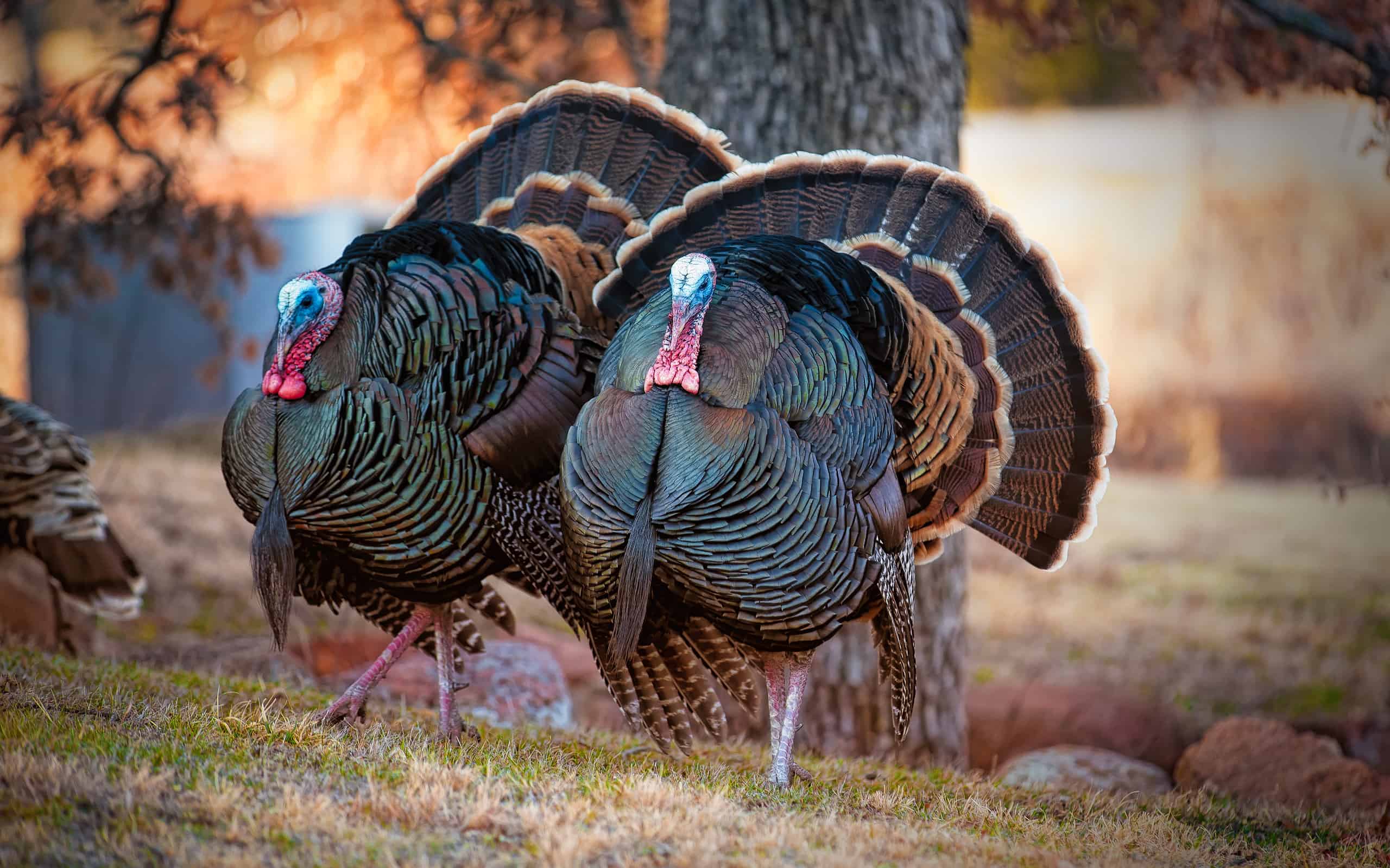Everyone loves a good turkey at Thanksgiving, but not necessarily pecking at their garden. The wild turkey may be an iconic American species that sustained Native American and colonial communities for centuries, but they can be pests in urban and suburban settings. Their constant foraging instinct leads them to destroy gardens and lawns, they hold up traffic when crossing the street, and males exhibit aggression during the mating season that results in charging and damaging cars as reflective surfaces.
Communities throughout the country deal with wild turkeys as a constant pest. There are now five subspecies of wild turkey that live in a vast majority of the continental U.S., into Mexico, and a small portion of Canada. If wild turkeys are in your backyard, you know how frustrating it can be. However, some deterrent measures are effective when used in conjunction with other efforts.

Like many birds, turkeys lack a strong sense of smell. Their nasal passages and olfactory lobes in their brains are underdeveloped compared to other species. Strong enough smells, though, can be enough to turn a wary turkey away from your yard. Let’s take a look at the nine smells that wild turkeys hate.
1. Peppermint Oil

The strong smell of peppermint oil repels many animals, including wild turkeys.
©Tatevosian Yana/Shutterstock.com
Is there anything peppermint oil can’t do? Most humans love this intense oil, but many animals and insects detest it. Rats, spiders, ants, skunks, and — yes! — turkeys all hate the smell of peppermint. To apply it, dilute it with water in a spray bottle and use it liberally in areas where turkeys congregate or pass through. Otherwise, you can mix it with vinegar and lemon oil for an extra-pungent nose bomb, soak some cotton balls in the mixture, and place them strategically around the area you want to protect.
2. Garlic
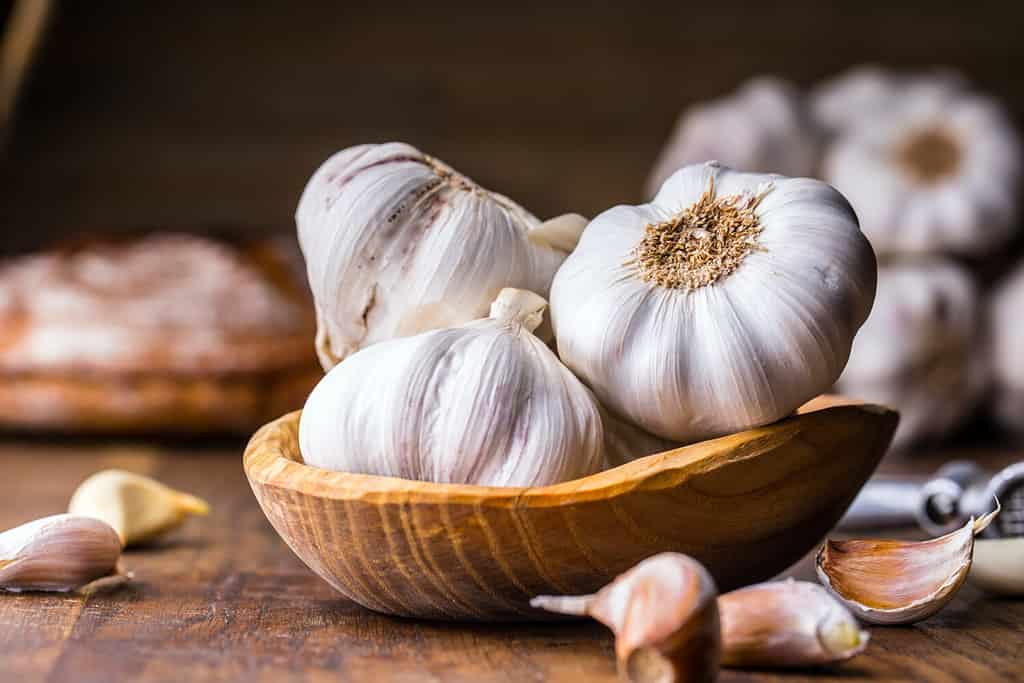
The allicin in garlic keeps many pests away. Wild turkeys especially hate the smell of fresh garlic.
©Marian Weyo/Shutterstock.com
Strong and aromatic, garlic is a great recipe ingredient and an even better deterrent. Garlic contains a natural irritant called allicin that works on various pests, even wild turkeys. A crushed garlic and water solution works well but, unfortunately, dissipates quickly, so you’ll have to keep reapplying. You can also use this garlic solution to protect near-ripe fruit from turkeys — just spray on individual fruits you want to save from their voracious appetites.
3. Cayenne Pepper
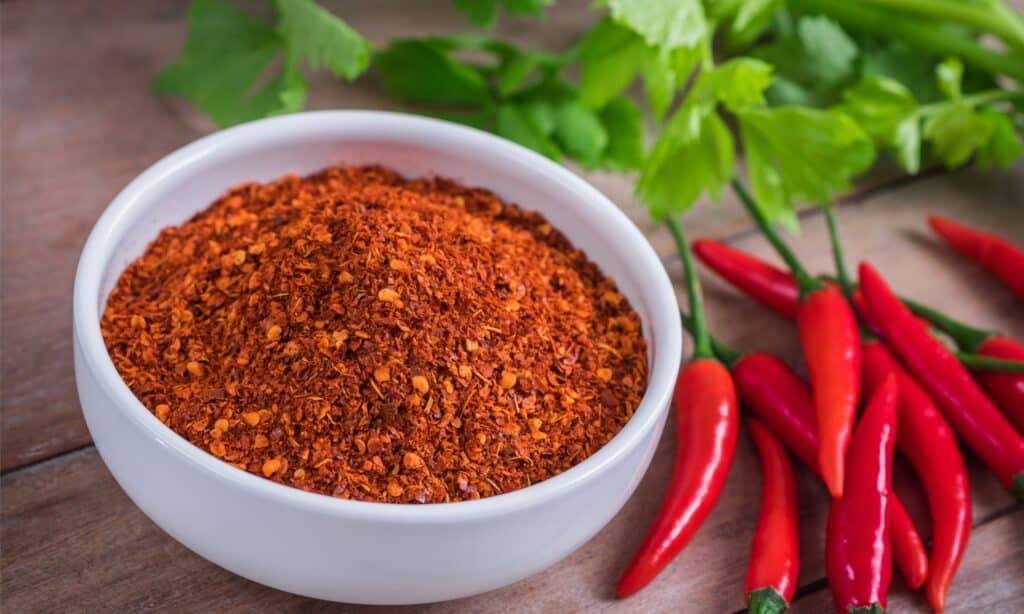
Cayenne’s spicy kick keeps even some humans away — no wonder it works as a wild turkey repellent.
©iStock.com/Amarita
We use cayenne when we want a punch to the senses. Why not apply that same thinking to your deterrents? The spiciness and pungence of these peppers work great to repel multiple pests, wild turkeys included. Fresh or dried cayenne work equally; just mix with water and spray generously. However, don’t spray it directly on your garden plants, as it can burn some tender foliage. You can also sprinkle dried cayenne along pathways for extra deterrence.
An alternative in the capsaicin lineup is a mix of other hot chilies and vinegar, which makes a potent smell barrier against wild turkeys. Fresh peppers work best in this case, blended with water and apple cider vinegar. This is purely for surfaces and structures, not for spraying around or on plants. Like many of the natural deterrents, this mix will need frequent reapplication.
4. Lemon

Wild turkeys, among many other animals, hate the smell of citrus.
©iStock.com/PJjaruwan
This sour and strong fruit makes our faces pucker — wild turkeys would react similarly if their faces could manage the expression. Instead, they’ll just steer clear of the area. Use fresh or bottled lemon juice or lemon oil diluted in water as a spray around gardens to keep wild turkeys and other birds away from your plants.
5. Oils

A variety of scented oils can turn a turkey’s head and dissuade it from bothering your garden or yard.
©botamochi/iStock via Getty Images
Lemon and peppermint oil appear above, but other strong oils like lavender, citronella, and lemongrass work well as smelly defense systems. The citrus compounds found in citronella and lemongrass both offer the same repellent properties as lemons, while the woody notes of lavender oil provide the same outcome. In addition, these oils also repel many insects like mosquitoes, so it’s a win-win. To use an oil-based repellent, you can dilute it with water and spray it around, or you can soak cotton balls in your oil of choice and scatter them in the contested area.
However, tree-based oils like eucalyptus, tea tree, cinnamon, sandalwood, and others can cause respiratory issues in birds, so steer clear of these options.
6. Vinegar

A multi-use solution around the home, be careful not to use vinegar-based deterrents around your plants.
©focal point/Shutterstock.com
Vinegar’s sharp and astringent properties make it a popular choice for cleaning, but did you know it will also help repel wild turkeys? The same compounds that make vinegar so pungent for us make it unbearable for the trouble-making birds. However, keep in mind that vinegar used near or on plants will kill them, regardless of the dilution.
Vinegar also makes a great additive to any mix-and-match deterrent solution you may decide to make. Combine many of the other smells listed above with vinegar for an extra-powerful nasal attack on the errant turkeys.
7. Sprays

Several commercial sprays exist as broad-species repellents, used for deer, rodents, wild turkeys, and more.
©Savanevich Viktar/Shutterstock.com
If all-natural attempts at repelling wild turkeys fail, it’s time to turn to some synthetic solutions. A variety of commercial sprays offend wildlife on several levels. These options can be more expensive but may last longer before you need to reapply. Many of these sprays are biodegradable and still nontoxic.
8. Bird Gel
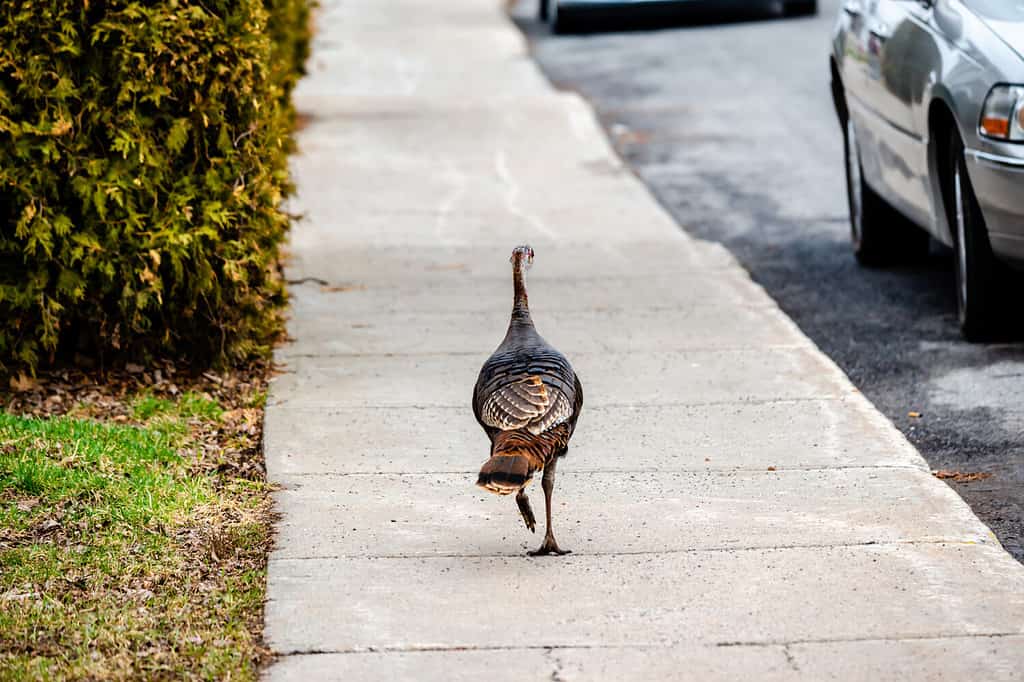
The smell, sight, and texture of bird gels will tell the neighborhood turkeys to keep moving.
©Pitofotos/Shutterstock.com
This product combines a couple of different senses to help deter turkeys. Commercial bird gel may be on the more expensive side, but it blends a strong peppermint oil smell with a sticky texture and a solid ultraviolet (UV) light signature. What turkeys lack in smell, they make up for in visual acuity — their ability to see things in the UV light range helps them find bugs and other food very effectively. Therefore, the UV glow of bird gel, and its strong smell, will effectively repel turkeys in your yard. In addition, commercial bird gel will last for years before it needs reapplication.
Never Use Mothballs

Gardening folklore says to deter wild turkeys with mothballs, but this is dangerous to humans and animals.
©Bowonpat Sakaew/Shutterstock.com
Though the acrid smell of mothballs may be an appealing deterrent, it’s also a dangerous one. Pets, humans, turkeys, and other wildlife alike will have severe adverse effects if they eat even the smallest bit. If left outside, mothballs may also melt in the rain and leach pesticide into the ground. As mothballs contain insecticides such as naphthalene or paradichlorobenzene, inhalation can cause respiratory effects. The Environmental Protection Agency (EPA) regulates mothballs as a pesticide, and mothball labels do not include use as animal deterrents. Any use outside the directions is illegal.
Other Deterrents
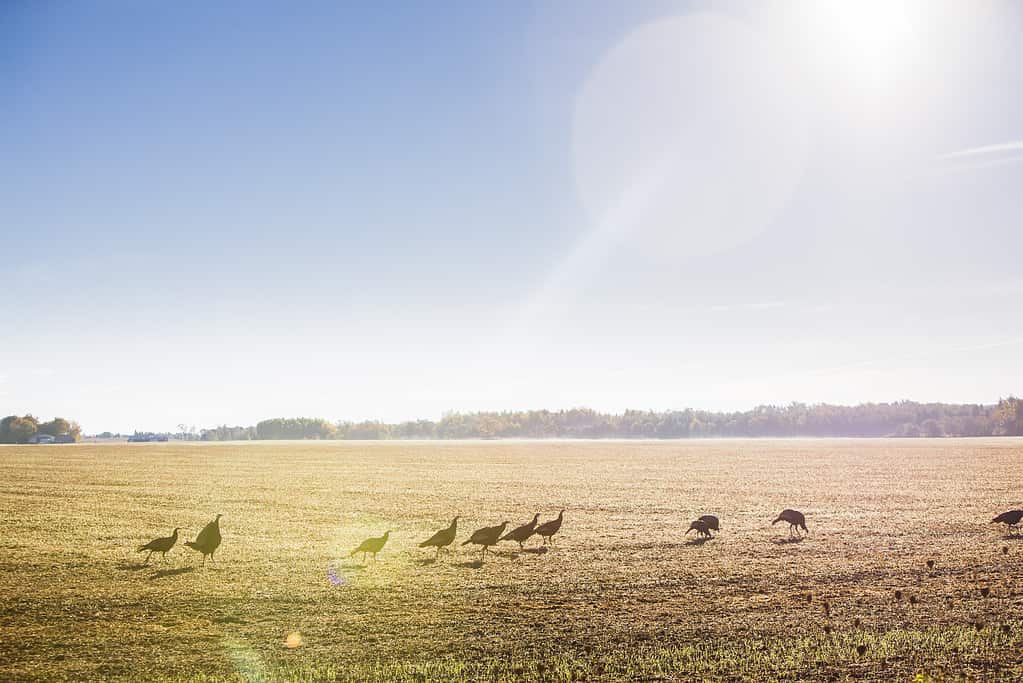
Wild turkeys roam a major part of the U.S., and you may need multiple measures to keep them away from your yard.
©seb29/ via Getty Images
Adding to your pungent arsenal is great, but it’s also not your only option. Other easy adjustments can help keep wild turkeys at bay as well.
Odds are, the turkeys are in your yard or garden searching for food. As foragers, these birds eat a wide variety of grasses, seeds, berries, bugs, and frogs, which can make it difficult to completely eliminate food sources for the opportunistic buggers. You can, however, make those foods harder to access so the flock will move on to easier pickings. Maybe your neighbor will like them?
- Keep any seed-filled bird feeders out of reach. Just because turkeys can fly doesn’t mean they like to! Also, install something to catch fallen seed so it doesn’t just collect in a convenient pile in the grass.
- Got bugs? Some vineyards and agriculture projects use turkeys as natural protection against bugs, but you don’t have to. Treat any bug infestations at the source, and hopefully, you’ll reduce the number of turkeys that come pecking.
- Protect your berry bushes. Easy chicken wire or landscape fabric fences may deter the wild turkeys long enough for them to lose interest in your potential harvest without requiring major landscape installations.
Turkeys may look big but are also highly cautious and wary birds. Scare tactics like metallic tape or CDs hung from trees, flashy windsocks or pinwheels moving in the breeze, sculptures of predators that “move” periodically, or a kite that looks like a bird of prey will make the wild turkeys think twice about entering your property. Loud noises, either caused by you when you notice them or by a motion-activated noisemaker, also deter the flighty birds.
Wildlife experts have noticed unique behaviors in urban and suburban flocks of wild turkeys. They have a tendency to think of the humans around them as other turkeys and, therefore, part of the flock’s pecking order. If that’s true where you live, use it to your advantage and establish yourself as a dominant turkey. Be bigger and more aggressive, chasing the turkeys off your property with the help of an umbrella, and they’ll soon defer to your dominance and leave you more or less alone. As a small downside to this, you may be potentially courted by a turkey in the future.
For a last resort, if nothing else keeps out those pesky fowl, if you’re at your wit’s end, it may be time to build some fortifications. As noted above, turkeys can fly, but they prefer not to. Those big bodies take a lot of energy to get airborne. Many first-hand accounts tell of turkeys taking advantage of open gates but never flying over the fence. So, while this is the most drastic and expensive option, it may be worth the peace of mind if all else fails.
Thank you for reading! Have some feedback for us? Contact the AZ Animals editorial team.

